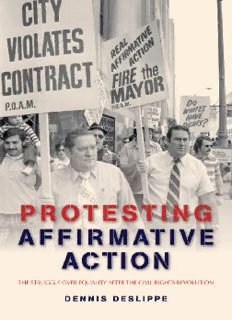
Protesting Affirmative Action: The Struggle over Equality after the Civil Rights Revolution PDF
Preview Protesting Affirmative Action: The Struggle over Equality after the Civil Rights Revolution
Protesting Affirmative Action reconfiguring american political history Ronald P. Formisano, Paul Bourke, Donald DeBats, and Paula M. Baker Series Founders Protesting Affirmative Action The Struggle over Equality after the Civil Rights Revolution DENNIS DESLIPPE The Johns Hopkins University Press Baltimore © 2012 The Johns Hopkins University Press All rights reserved. Published 2012 Printed in the United States of America on acid-free paper 2 4 6 8 9 7 5 3 1 The Johns Hopkins University Press 2715 North Charles Street Baltimore, Maryland 21218-4363 www.press.jhu.edu Library of Congress Cataloging-in-Publication Data Deslippe, Dennis. Protesting affirmative action : the struggle over equality after the civil rights revolution / Dennis Deslippe. p. cm. — (Reconfiguring American political history) Includes bibliographical references and index. ISBN-13: 978-1-4214-0358-8 (hardcover : alk. paper) ISBN-10: 1-4214-0358-7 (hardcover : alk. paper) 1. Affirmative action programs—United States—History. 2. Equality—United States—History. 3. Race discrimination—United States—History. 4. United States—Race relations—History. 5. Affirmative action programs—Law and legislation—United States. I. Title. HF5549.5.A34D427 2012 323.173—dc23 2011019911 A catalog record for this book is available from the British Library. Special discounts are available for bulk purchases of this book. For more information, please contact Special Sales at 410-516-6936 or [email protected]. The Johns Hopkins University Press uses environmentally friendly book materials, including recycled text paper that is composed of at least 30 percent post-consumer waste, whenever possible. To Therese and John This page intentionally left blank contents Acknowledgments ix List of Acronyms and Initialisms xi Introduction 1 1 “The Best ‘Affirmative Action Program’ Is Creating Jobs for Everyone”: Organized Labor Responds to Affirmative Action, 1960–1974 14 2 “This Strange Madness”: The Origins of Opposition to Higher Education Affirmative Action, 1968–1972 49 3 “This Issue Is Getting Hotter”: The Struggle over Affirmative Action Policy in the Early 1970s 79 4 “Treat Him as a Decent American!”: DeFunis v. Odegaard (1974) and Colorblindness in the Courtroom 111 5 “Do Whites Have Rights?”: White Detroit Policemen and the “Reverse Discrimination” Protests of the 1970s 150 6 “The Fight for True Nondiscrimination”: The Politics of Anti–Affirmative Action in the 1970s 180 Conclusion 209 Notes 221 Essay on Sources 265 Index 271 This page intentionally left blank acknowledgments When I began this project, I worried that I would receive little support for such a polarizing topic. As you can read in these acknowledgments, this concern was unnecessary. I am pleased to thank the institutions and people who assisted me over the past decade. I could not have written this book without the generous re- search funds I was given by the American Philosophical Society, the Australian National University, the Gerald R. Ford Presidential Library, and the Schlesinger Library at Harvard University. A National Endowment for the Humanities Fel- lowship in 2005 was crucial in moving the project along. Librarians and archivists were indispensable in facilitating my research, espe- cially those at the American Jewish Archives, the American Jewish Committee Library, the American Jewish Historical Society, the Bentley Historical Library at the University of Michigan, the Jimmy Carter Presidential Library, the George Meany Memorial Archives, the Gerald R. Ford Presidential Library, the Histori- cal Society of Pennsylvania, the Hoover Institution Library and Archives at Stan- ford University, the Library of Congress, the National Archives, the New York Public Library, the State Historical Society of Wisconsin, the Walter P. Reuther Library at Wayne State University, the University of Washington Library Special Collections, and the Yale University Library. Tom Karel, Michael Lear, Christo- pher Raab, Mary Shelly, and Scott Vine at the Franklin and Marshall College Library provided skilled assistance along the way. My thanks to those scholars who read, offered suggestions, and encouraged me: Martha Biondi, Kevin Boyle, David Colman-Lewis, Jeff Cowie, Jonathan Goldberg-Hiller, Laura Kalman, Greg Kaster, Linda Kerber, Matt Lassiter, Sophia Lee, Nancy MacLean, Jack Metzger, Alan Petigny, and Tom Sugrue. Although some of our interpretations differ on affirmative action, their scholarship is manifest on every page. In addition to these readers, I have presented selections from the manuscript at conferences, including those of the American Society for
Description: